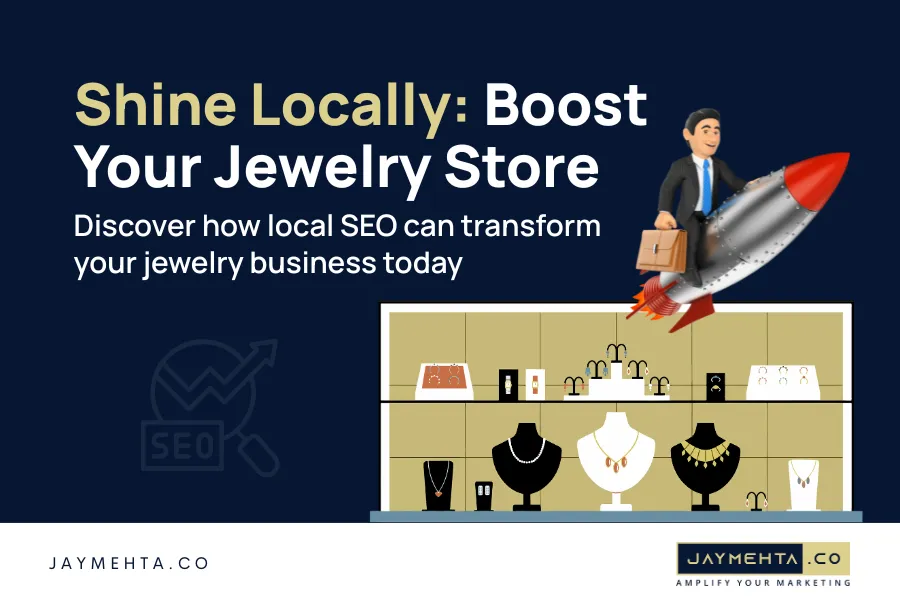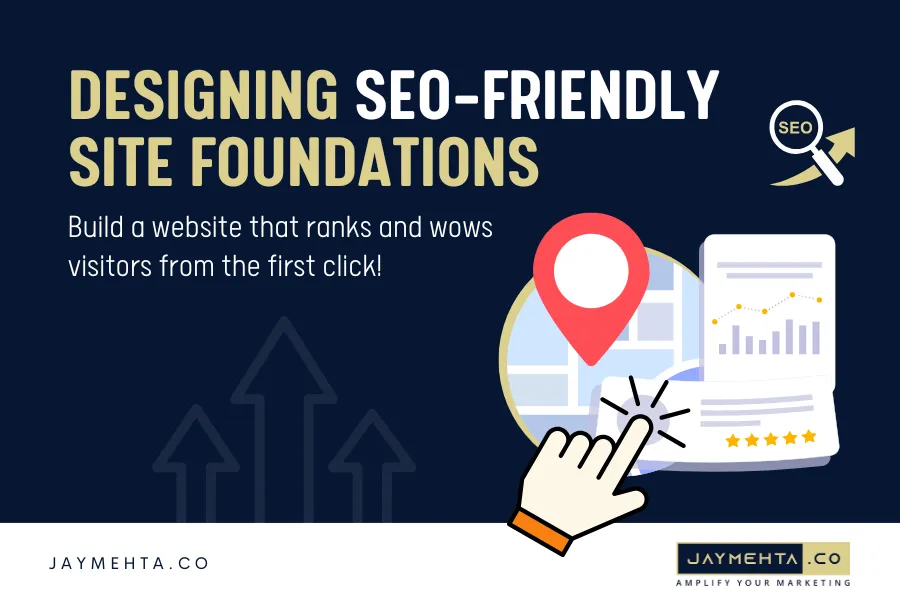In the present era of technology, where the internet offers a wealth of information at your fingertips, search engine optimization (SEO) serves as the critical conduit that connects plastic surgeons with potential patients. Essentially, SEO streamlines the process of enhancing your practice's online visibility, making it more accessible to individuals seeking your professional expertise.
Have you ever wondered why some plastic surgeons achieve greater success than others, even when they provide the same high-quality services? The answer lies in Search Engine Optimization (SEO), where advanced algorithms direct patients to specific clinics.
When a patient decides to find the best plastic surgeon in their area, they typically start their search online through platforms like Google or other search engines.
The search results page displays relevant information, allowing patients to reduce their search time and easily find well-established plastic surgery practices in their area.
Search engines, such as Google, utilize advanced algorithms to assess and sort websites, ensuring that the most relevant results are presented to those conducting searches.
In this context, the algorithm considers factors such as the plastic surgery office's location, keywords, organic web traffic, reviews, paid advertisements, and more when determining which websites appear in the search engine results.
Establishing a strong online presence is crucial so that your website ranks at the top of the results page for the search terms commonly used by prospective patients in search of plastic surgery services.
Caring for your website's SEO as a plastic surgeon means optimizing it to secure high rankings for relevant search terms, ensuring that your website is prominent for local patients actively seeking plastic surgery services.
Consider this: 88% of your potential customers eagerly anticipate scheduling consultations at your clinic. The challenge, however, is that they need to find your clinic on the first page of search engine results. This is where proven SEO strategies for plastic surgeons come into play, ensuring your practice is visible to patients actively searching for your expertise.
If you're a plastic surgeon, SEO shouldn't be ignored!

Why? Because most patients tend to avoid advertisements. Furthermore, if your practice doesn't appear on the first page of Google search results, you could be missing out on a significant portion of potential patients—some studies suggest as many as 95%. The trend is clear: more and more patients rely on the Internet to discover clinics and assess surgical expertise.
In reality, plastic surgery SEO services encompass a set of proven strategies to expand your patient base and boost your revenue. SEO for plastic surgeons can provide you with:
-
A Boost in Visibility
-
A Growth in Rankings
-
A Spike in Qualified Leads
-
A Revenue Boost
Given the abundance of plastic surgeons in the contemporary market, it's critical to understand how people choose the best clinics for their needs. The answer is clear: Google.
If your goal is to have more patients scheduling appointments at your clinic, securing a prominent place on the first page of Google or any other popular search engine is an imperative step. Discover the essential basics to achieve this below.
What Does SEO Mean for Plastic Surgeons?
SEO is not a mere buzzword but the driving force behind your website's visibility.
Think of SEO as a contemporary blend of a business card, a billboard, and word-of-mouth recommendations all rolled into one. It acts as your digital handshake, introducing you to potential patients and instilling confidence in your expertise.
When a potential patient inputs a query into a search engine, such as ‘top plastic surgeon near me’ or ‘rhinoplasty in [city name],’ how likely is it that your name will be at the top of the search results? SEO is the solution.
-
How Does SEO Work?
Imagine search engines like Google as meticulous librarians. When someone submits a query, these librarians carefully sift through countless web pages to provide the most relevant and authoritative responses. This process makes it easier for search engines to understand, categorize, and rank your website.
The more accurate and informative your content is, the more likely a 'librarian' will recommend your site to someone looking for plastic surgery services.
As a dedicated plastic surgeon who has honed your skills over the years, it is time to ensure that your online presence reflects your offline expertise. Investing in SEO is the way to be seen and grow your practice.
-
Strategies Tailored for Plastic Surgeons
Identify your target audience and construct your online presence with them in mind. Utilize tools like Google Analytics to gain comprehensive insights into your potential clientele and focus your marketing efforts where they will have the greatest impact.
Content marketing enables you to share information with the public, and high-quality content guarantees that your website offers solutions to common issues in your field.
For instance, if your website includes a blog on minimizing the appearance of scars or a video guide on identifying various types of rashes and skin conditions, potential patients will discover your brand organically and remember when they need a plastic surgeon.
When people search for plastic surgery-related queries in your locality, ensure your website provides the solutions. Harness the power of plastic surgery SEO, just as you would your surgical instruments, to deliver precise performance and the desired results.
-
Benefits of SEO for Plastic Surgeons
Due to the highly competitive nature of their industry, plastic surgeons require SEO. Patients actively seek the best plastic surgeons online, necessitating a strong online presence to secure a position on the first page of Google and other search engines. SEO is the key to achieving this.
Furthermore, SEO helps plastic surgeons generate more leads from prospective patients. Plastic surgeons can create content that resonates with individuals searching for information on specific procedures by employing targeted keywords and phrases. This content can drive traffic to the surgeon's website or blog posts.
-
Lead Generation
Quality content marketing is a critical component of a plastic surgery SEO campaign. Your target audience will readily find you when your website consistently ranks as the top result for queries ranging from identifying skin cancer to understanding various cosmetic procedures. Align your marketing strategies with current trends alongside your SEO efforts to witness an increase in lead generation.
-
Building Your Brand
Establishing a robust brand is essential for maintaining a successful practice. Your brand serves as the face of your business and encompasses all aspects that your current and potential clients use to distinguish your practice from the competition. Deliver superior plastic surgery services and maintain a consistent branding approach across all channels to cultivate loyalty and brand awareness.
-
Enhanced Web Traffic
hen your plastic surgery SEO strategy proves effective, your website will experience a substantial increase in web traffic over time. Once you attract potential patients to your website, ensure that you maintain their interest through an appealing website design and high-quality content that answers their questions. Over time, you will witness a conversion of visitors into satisfied customers.
-

Step-by-Step SEO Blueprint: Optimize Your Plastic Surgery Website
- Securing Your Digital Domain
- Investing in Reliable Web Hosting
- The Vital Role of Websites in SEO for Plastic Surgeons
- Enhance Your Google Business Profile
- Complete Your Clinic's Google Business Profile
- Ensuring Your Technical SEO is on Point
- Ensure Your On-Page SEO is Optimized
- The Role of Blogging in Plastic Surgery SEO
Patients seeking plastic surgery services heavily rely on online searches to find the most efficient plastic surgeon. Using search engines like Google or Bing, they can locate the nearest clinic or access updated information about various procedures.
Given the significant volume of online searches related to plastic surgery, specialists employ strategies such as SEO for plastic surgeons.
Let's explore search engine optimization (SEO) and how it can accelerate the online growth of plastic surgery practices.
-
Securing Your Digital Domain
The foundation of a robust online presence begins with obtaining a domain name. Your domain is the digital address where potential patients can discover your clinic. Yet, it's more than a mere address; it's a fundamental aspect of your brand identity.
Selecting the ideal domain name is a strategic decision. You may include your name, clinic name, and industry-specific keywords to create a relevant and memorable domain. To maximize user-friendliness and clarity, it is recommended that you prioritize simplicity and ease of spelling and avoid special characters or hyphens.
Your website's domain name should reflect your medical practice and services, making it easier for potential patients to find you online. For example, a domain name like ‘DrJayMehtaClinic.com’ is more professional and helps patients quickly identify your practice.
-
Investing in Reliable Web Hosting
The next crucial step is investing in reliable web hosting. Think of web hosting as leasing a space on the Internet for your website. The performance and security of your online presence depend on the quality of your hosting service.
When choosing a hosting provider, prioritize scalability and top-notch technical support. A dependable hosting service minimizes downtime and ensures swift page loading times, essential for delivering a seamless user experience. In an industry where efficiency and dependability are non-negotiable, your choice of web hosting significantly impacts your online success.
In the healthcare field, where patient confidentiality is paramount, ensuring the security of your website is essential. Invest in SSL certificates to provide a secure connection for your website visitors. This protects sensitive patient data and improves your search engine ranking, as search engines prioritize secure websites.
-
The Vital Role of Websites in SEO for Plastic Surgeons
As a plastic surgeon, your website's importance in marketing cannot be overstated. It serves as the first point of contact for potential clients, whether they find you through traditional advertising or online searches. Therefore, ensuring that your website provides a great first impression is crucial. If visitors experience long loading times or struggle to find relevant information, they may leave your site and seek other options.
Ignoring the significance of your website would be a grave mistake.
-
Foundations of an Effective SEO Strategy
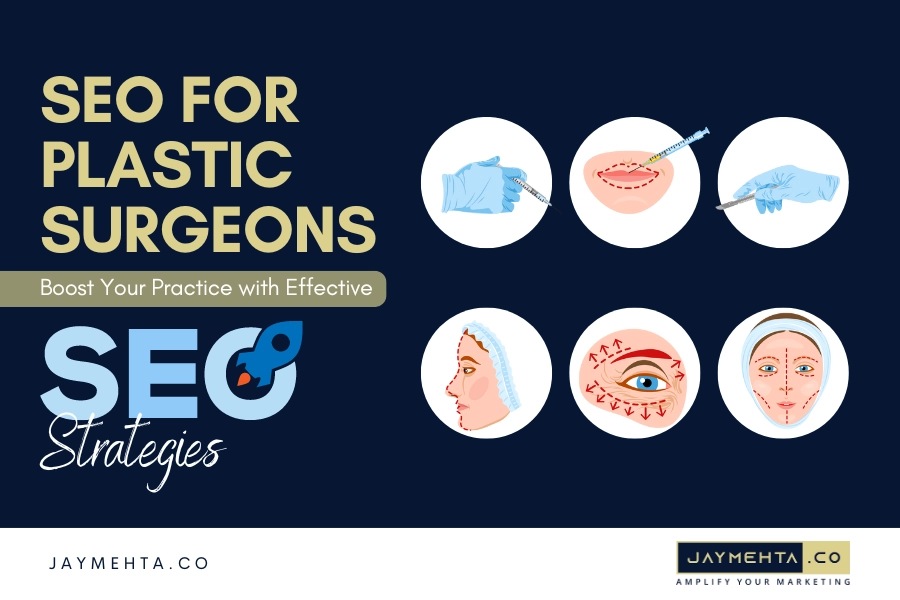
Your website serves as the foundation of a comprehensive SEO strategy. Several key elements should be part of your website optimization checklist:
-
Page Speed: The loading speed of your website's pages has long been a critical factor in search engine rankings.
-
Core Web Vitals:This encompasses page loading time, user interaction duration, and your site's visual stability.
-
SSL (Secure Sockets Layer): An SSL certificate validates your website's trustworthiness and ensures user data security.
-
URL Structure: Utilizing keyword-rich URLs supports higher rankings and provides a structured hierarchy for search engine indexing.
-
Conversions: Calls to action (CTAs) should be readily accessible to users at every sales funnel stage.
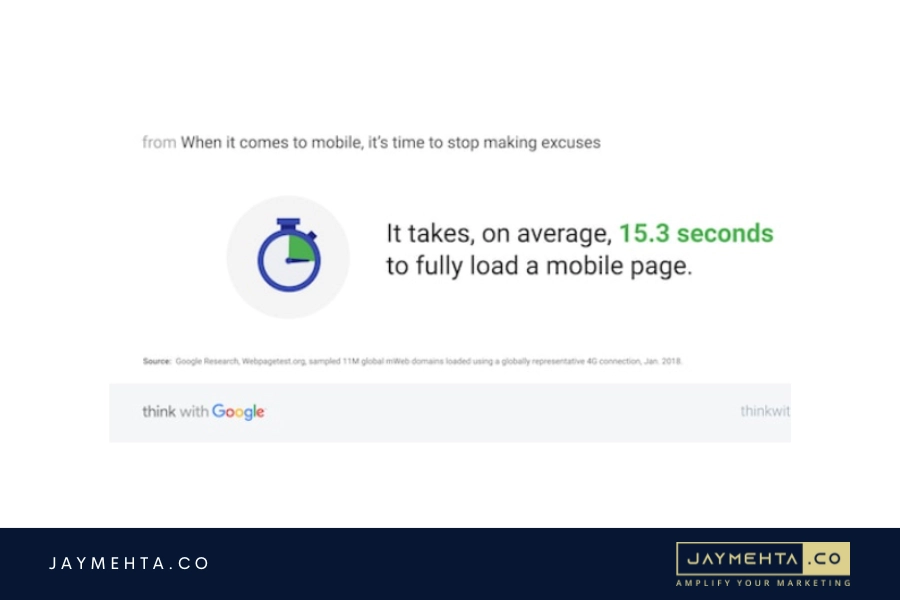
Your web pages must align with the ever-evolving Google algorithm for optimal rankings. While the technical aspects of plastic surgery SEO are crucial, your content must also engage and attract current and potential patients.
-
-
Four Key Strategies for Organic SEO in Plastic Surgery Practices
-
Keyword Research:Identify relevant terms with manageable competition levels that can generate substantial website traffic.
-
Website Optimization:An optimized website should be user-friendly, easy to navigate, contain regularly updated content aligned with relevant keywords, and feature optimized back-end tags corresponding to page content.
-
Local SEO:This specialized form of SEO focuses on attracting local patients and is a pivotal component of your overall plastic surgery SEO strategy.
-
Link Building:Your practice should secure high-quality, authoritative backlinks from relevant websites.
-
-
Key Terms in Website SEO for Plastic Surgeons
Before delving into the specifics, let's explore some essential terms you should be familiar with:
-
On-Page:This term encompasses everything on your website, including content, layout, structure, and metadata.
-
Content:This category includes your service webpages, blog posts, videos, infographics, and images accessible to site visitors.
-
Off-Page:These elements include directory listings, link building, and citations.
-
Technical SEO:This category covers issues related to site speed, structured data markup, site security, and other technical tasks associated with plastic surgery SEO.
Plastic surgeons can significantly enhance their online presence by understanding the crucial terms in website SEO and implementing the recommended strategies. This will attract more patients and strengthen their position in the competitive field of plastic surgery.
-
-
-
Enhance Your Google Business Profile
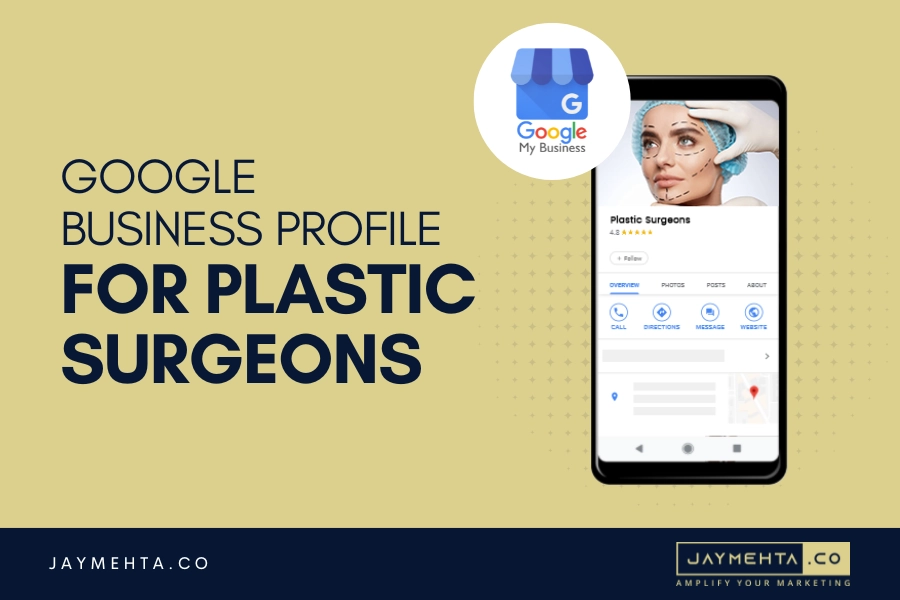
In most scenarios, SEO for plastic surgeons primarily revolves around local SEO. Optimizing your Google Business Profile for better visibility on Google Maps and local search results is a crucial aspect of your search engine optimization strategy.
When a person searches for ‘facelift Texas,’ the map listings are the first results they see after the paid advertisements.
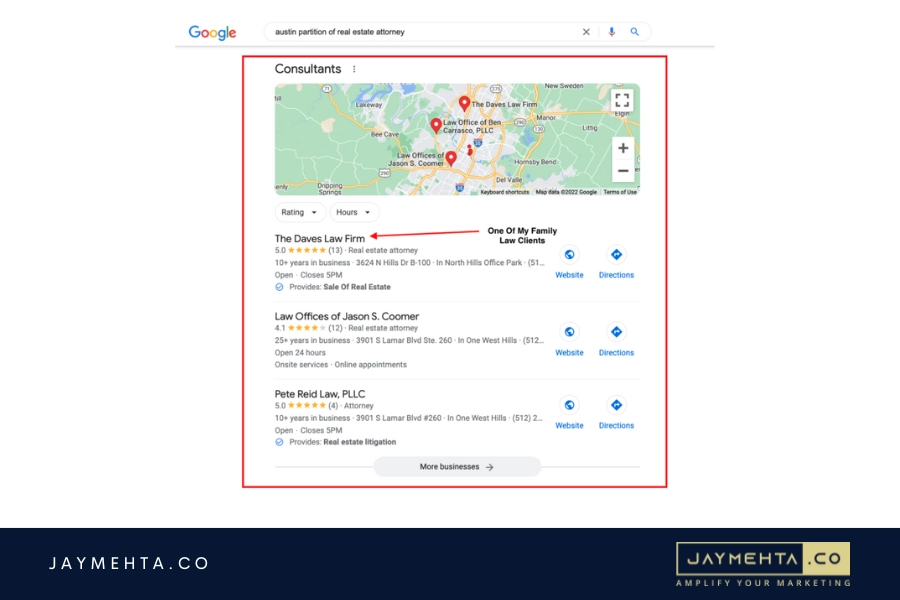
Your Google Business Profile is crucial for potential patients in organic search results. It holds a pivotal role in their journey due to its reviews. The quantity and quality of these reviews significantly impact whether a prospective patient will click through to your website for more information.
In summary, successful SEO for plastic surgeons goes beyond just improving your website's search engine ranking. It also involves securing a place in local map results and encouraging more clicks.
Google Maps determines local map results in Google search based on several factors, including:
-
Relevance
How closely do plastic surgeons align with the search query? For instance, when a patient searches for ‘best rhinoplasty surgeons Texas’, Google Maps returns results for plastic surgeons whose websites prominently feature ‘rhinoplasty’.
-
Distance
The proximity of the plastic surgeon to the user's location plays a crucial role. Google Maps prioritizes businesses closer to the user. This can be challenging for plastic surgeons in their city's non-prime areas. For instance, a plastic surgeon in Northeast Philadelphia is unlikely to rank highly in map results for a search like ‘breast augmentation Philadelphia’ performed in Center City, Philadelphia.
-
Prominence
The business's reputation and visibility are vital. Google Maps factors in elements such as the business's website backlink profile, online reviews, brand searches, and social media presence.
-
User Intent
Google Maps strives to understand the user's intent behind their search. For instance, a user searching for ‘rhinoplasty’ may seek information about rhinoplasty rather than a local facial plastic surgeon. In such cases, map results may not initially appear at the top of search results.
Here are straightforward steps to enhance your plastic surgery practice's Google Business Profile visibility in map results.
-
-
Complete Your Clinic's Google Business Profile
Ensure your profile is fully filled out, including high-quality photos in all sections. People want to see their plastic surgeon and might be interested in your office's interior. If past patients permit, include "before and after" photos in your Google Business Profile.
Note: Enhance the quality of your photos by investing in proper photography equipment. Many before-and-after photos of plastic surgery suffer from subpar photography. Allocating some funds for better lighting and utilizing a high-quality camera can result in nearly professional-level photos. Just be sure to eliminate obnoxious fluorescent office lights.
Compliance with Google Business Profile guidelines is essential:
-
Ensure your listing matches your signage.
-
Do not create a listing for an address or office without daytime staffing.
Failure to adhere to these guidelines could result in profile suspension and the loss of all reviews. It's crucial to comply with these rules. You can review Google Business Profile guidelines for further details.
-
Maintain Consistent Name, Address, and Phone Number for Your Plastic Surgery Practice
As you complete your Google Business Profile, establish a consistent name, address, and phone number (NAP consistency) for your clinic. This format should be consistent on your website, in the schema markup on your website, and across any social media or directory listings associated with your clinic.
In other words, don't use ‘rt77’ as your clinic's address on your Google Business Profile while using ‘US-75’ on your website or Facebook page. Google may struggle to recognize these as the same location, leading to uncertainty about your actual address.
Ensure that the name and phone number on your Google Business Profile match the information on your social media profiles, website, and website schema.
-
Establish a Routine for Requesting Reviews
Obtaining reviews for your plastic surgery practice can be challenging, as many patients may not be eager to publicize that they've had procedures. However, perseverance is key; your competitors face the same challenge. You must put in more effort than other clinics to accumulate positive reviews.
Apart from building trust with prospective patients by showcasing numerous reviews, the keywords used in your patients' reviews can influence your appearance in map results. Encourage patients to mention specific procedures like rhinoplasty, facelift, or other cosmetic treatments in their reviews, as this can greatly boost your visibility in map results. Don't hesitate to request reviews and follow up if they are not provided promptly.
-
Secure Backlinks From Reputable Websites for Improved Map Results Ranking
Google considers links from one website to another as a vote of confidence. When other websites link to your site, it helps elevate your Google Business Profile's rank.
Further details on link building will be explored later in this article. Still, it's essential to understand that backlinks are critical for achieving higher rankings in map and organic search results. SEO for a plastic surgeon is notably challenging without backlinks.
-
Begin Using Google Posts
Although Google Posts might not directly enhance your map results ranking, they can influence prospective patients' decisions to schedule a consultation with you.

In essence, Google Posts provides a platform for sharing updates and announcements about your business on Google Search and Maps.
-
-
Ensuring Your Technical SEO is on Point
The quality of your website's technical SEO is paramount. Even if you have top-notch content, if Google can't properly crawl and index your site, it won't appear in search engine results. It's crucial to get your technical SEO right.
The good news is that plastic surgeons typically have straightforward websites, often opting for WordPress, which simplifies SEO compared to other content management systems. However, there are still opportunities to make technical SEO improvements.
These improvements should streamline Google's ability to crawl and index your clinic's website and aid in understanding the importance and meaning of specific pages and their content.
While this article isn't a comprehensive guide to technical SEO, it highlights some significant technical improvements commonly applicable to plastic surgery websites.
-
Noindex Low-Value Archive Pages
It's advisable to "noindex" automated archive pages generated by WordPress, including tag, author, category, and similar archives. These pages generally don't offer much value to search engines or prospective patients, so excluding them from search results is often beneficial.
Typically, we recommend using "noindex, follow" for these archive pages. This prevents them from appearing in search engine results while allowing them to pass link equity and assist in creating a content cluster around specific topics through internal linking.
-
Implement Breadcrumbs on All Procedure Pages
Breadcrumbs are valuable for helping website visitors navigate between their current page and higher-level pages within the website's hierarchy. They also aid Google in understanding your website's structure, which is particularly vital when executing a location page strategy.
This strategy might involve creating procedure pages to target queries like ‘procedure + city’. By using breadcrumbs and establishing a robust internal linking structure between these pages, you can enhance your plastic surgery practice's visibility on Google, not just in your physical location but also in any market you wish to target. Further details on this will be discussed later.
-
Ensure Your Clinic's Website Meets Google's Core Web Vitals
Google incorporates a component known as Core Web Vitals into its ranking algorithms. These metrics collect user data to measure the real-world experience of visitors on your website. You can assess your website's performance here!
Core Web Vitals evaluate three aspects of user experience:
-
Largest Contentful Paint:The time it takes for the largest element on your page to load.
-
Cumulative Layout Shift:How frequently elements such as buttons move after the page loads.
-
First Contentful Paint:The time it takes for the browser to display the first page elements.
-
Google aims to provide its users with mobile-friendly, fast-loading pages with stable layouts.
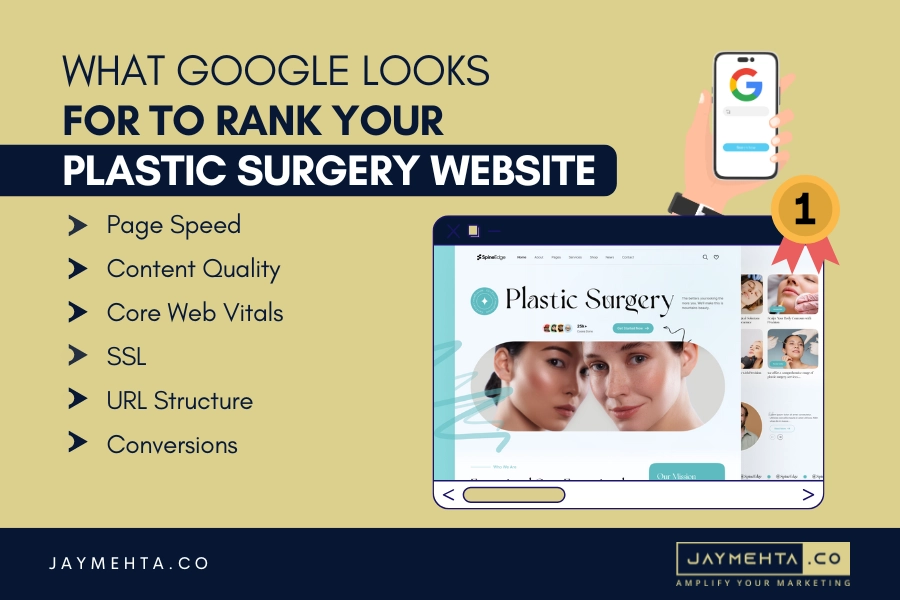
-
-
Ensure Your On-Page SEO is Optimized
Creating high-quality content is the key to successful SEO for plastic surgeons. The main goal is to ensure that your website's content caters to as many patient queries as possible while being more comprehensive and authoritative than your competitors. This will help your website rank higher in search engine results and attract more potential patients.
Identifying the keywords and topics your plastic surgery clinic should cover can be accomplished through effective keyword research.
Related blog: Technical SEO Audit Checklist to Improve Your Website's Ranking
-
Develop an SEO Content Strategy Backed by Keyword Research
Keyword research involves the process of discovering and analyzing the keywords and phrases that potential patients use when searching for plastic surgeons and information on plastic surgery online. It is a crucial component of SEO because it aids in understanding the needs of your target audience and helps you optimize your website to rank higher in search engine results pages (SERPs) for those specific keywords.
What are the key phrases that potential patients are searching for on Google? And how can you optimize your content to appear more prominently when they perform these searches? Answering these crucial questions can help you attract organic traffic to your website and boost your clinic's growth.
There are several methods for conducting keyword research, with some of the most common approaches including:
-
Brainstorming:Initiate the process by generating a list of keywords and phrases relevant to your practice and your target audience. You can also utilize tools like Google Keyword Planner to generate new keyword ideas.
-
Competitive Analysis: Examine the keywords and phrases that your competitors are targeting on their websites. Tools such as SEMrush or Ahrefs can assist in this analysis.
-
Utilizing Keyword Research Tools: Numerous keyword research tools, such as Google Keyword Planner, SEMrush, and Ahrefs, are available. These tools offer valuable insights into keywords, including search volume, competition, and related keywords.
Various data sources can be tapped for keyword research, each offering varying levels of accuracy. Here's a rating of different keyword research tools commonly used by SEO professionals:
-
Google Ads Search Queries Reports (considered the most accurate source for keyword data).
-
Google Search Console (a close second).
-
Ahrefs or Semrush (a more distant third).
-
Also asked (for a free tool suitable for blog topic research).
-
Ubersuggest (a fallback option when other tools are unavailable).
After selecting a keyword research tool, the next step is understanding what people are searching for. Specifically, for your procedure pages, you'll want to discern how potential patients are searching for the cosmetic procedures you offer. For instance, are they searching for ‘rhinoplasty surgery’ or ‘rhinoplasty surgeons’? Are they inquiring about ‘neck lifts’ or ‘chin liposuction’?
-
-
Evaluating Your Competitors' Keyword Strategies
Conducting in-depth research on market competitors and gaining valuable keyword insights is crucial as a plastic surgeon. A reliable SEO tool such as Ahrefs can prove to be an essential asset in this regard by providing critical information, including backlinks, organic search traffic, and keyword rankings.
However, it is imperative to carefully proceed with the necessary steps to ensure accurate and effective research to help you make informed decisions and take the right course of action.
-
Register an account with Ahrefs.
-
Enter your competitor's website URL into Ahrefs' Site Explorer tool.
-
Access the ‘Organic Keywords’ report, which lists keywords your competitor's website ranks for in SERPs.
This list of keywords can be analyzed to determine which are most relevant to your plastic surgery practice and your target audience. In addition to the Organic Keywords report, Ahrefs offers several other features for researching your competitors and obtaining keyword data:
-
Competing Domains:This report lists websites competing with yours for organic traffic.
-
Content Gap: This report highlights new keyword opportunities for your SEO by analyzing your competitor's ranking keywords that are not present on your website.
-
Top Pages:This report displays your competitor's website's most popular pages based on organic traffic volume. This information is valuable for understanding the topics that interest your target audience and the content you should create on your website.
-
-
-
The Role of Blogging in Plastic Surgery SEO
Blogs can play a significant role in enhancing a website's authority and trustworthiness. Initially, blogs can catalyze other websites to link to yours, especially if your content provides definitions and data that can support content on other websites. When other websites link to your blog, it sends a positive signal to search engines that your website is a reliable source of information.
Additionally, your blog can serve to engage with your target audience. When conducting keyword research for your blog, the objective is to identify opportunities to address questions related to your expertise in procedures. This often leads to discovering "long-tail keywords" that can help you connect with prospective patients effectively.
For instance, a facial plastic surgeon might aim to rank for searches such as ‘rhinoplasty for bulbous nose.’ Patients may be willing to travel across the country to consult with a specialist they believe can provide superior results in a specific area. Your blog provides the platform to showcase your expertise.
-
Craft a Compelling and Well-Optimized Title Tag for Your Procedure Pages
A page's title tag appears in search engine results when users perform a search. Typically, it looks like this:
The title tag of a webpage arguably has the most significant impact on its search engine ranking among all on-page factors. Therefore, including a variation of your primary keyword is essential while making it appealing and clickable. The ideal title tags include target keywords and provide a compelling reason for users to click on them.
An effective title tag accomplishes three key objectives:
-
It places the target keyword at the start of the title tag.
-
It communicates a unique value proposition about the clinic.
-
It includes the name of the surgeon, who holds a strong reputation both locally and within the industry.
This could lead to a higher click-through rate, and Google may recognize the increased engagement, resulting in improved search ranking.
-
-
Create Comprehensive and Information-Rich Content for Each Procedure
Once you have optimized your title tag, the next step is to offer value to potential visitors. Consider what Google prioritizes—providing information-rich search results on topics people are researching online.
Google has extensively indexed the Internet and understands the information that should be present on a page about procedures such as breast augmentation.
Your goal is to deliver concise, information-rich content for each procedure. This typically involves researching content that ranks well on Google, not just in your local market but also in competitive markets like Houston, Fort Worth, Dallas, or major cities in Texas.
Crafting a comprehensive outline backed by research can significantly improve your website visitors' browsing experience. When optimizing your page for a specific query such as 'BBL Dallas,' it is advisable to include multiple sections covering topics like techniques, recovery times, costs, and procedures. A page that lacks subtopics, such as recovery time, would be perceived as less valuable than one that includes them.
Several tools use natural language processing to identify entities in top-ranking search results. These tools can assist in enhancing content by incorporating these entities. Furthermore, they provide an understanding of how artificial intelligence categorizes and interprets these entities.
-
Establish Strong Internal Linking to Your Procedure Pages
Effective internal linking helps distribute link equity across your website, enhancing the ranking of your procedure pages.
Firstly, make use of breadcrumbs.
Cleverly implemented breadcrumbs serve a dual purpose: they streamline navigation between your location pages and higher-level procedure pages while also assisting Google in comprehending your website's structure. Furthermore, they facilitate the transfer of link equity between these pages, ultimately increasing their search engine rankings.
Secondly, establish links from your parent pages to your child pages.
For example, your '/otoplasty/' page should feature a section that allows you to link to your location-specific landing pages, such as:
-
'/otoplasty/dallas-city/'
-
'/otoplasty/hudson/'
-
'/otoplasty/houston-city/'
Typically, you should include a section on each child page linking to the others. Internal linking connecting all child pages and linking back to the parent page creates a content cluster focusing on the topic of otoplasty in a specific area, effectively distributing page rank and improving their search engine rankings.
Finally, ensure all top-level process pages link directly to your homepage. You can add a section similar to the one below.
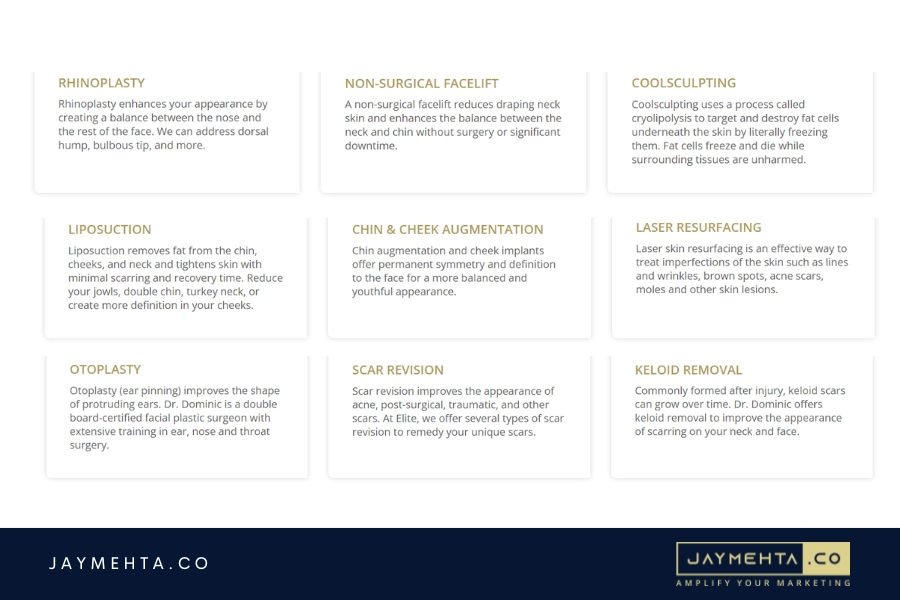
A website's homepage often receives the most links. Linking to each of your procedure pages from the homepage will pass more link equity to them, increasing the likelihood of them ranking well for your targeted keywords.
-
-
Enhance the Trustworthiness and Authority of Your Website
Google evaluates a website's trustworthiness and authority using two main criteria: the websites that link to yours and the quality of your content.
-
Getting Backlinks: An Important Aspect of Plastic Surgery SEO
Google incorporates backlinks as a pivotal element of its ranking algorithm. Essentially, it assesses the websites that link to your site and the links connecting to those websites.
The concept behind this is that reputable sources, such as Women's Health or respected newspapers like The New York Times and USA Today, are more inclined to link to highly credible websites.
Simply put, the links your website accumulates are akin to small votes of confidence. It is essential to acknowledge that building a robust backlink profile can be quite challenging.
There are established methods for fortifying a website's backlink profile, all of which demand considerable time and specialized skills. Notably, only a few SEO agencies specializing in plastic surgery possess this expertise, which is more commonly available to larger corporations.
It's important to emphasize that while spammy methods like purchasing backlinks exist, they risk penalization, potentially leading to a website's removal from search results. Therefore, if you decide to work with an SEO agency offering link-building services, it's imperative that they strictly adhere to Google's guidelines.
-
The Significance of Expertise in Your Content
Google has made significant progress in elevating the quality of search results, especially for topics classified as "your money or your life."
Topics related to finance, health, science, or subjects that might influence significant life decisions undergo rigorous algorithmic scrutiny. In other words, content related to your plastic surgery should reflect a high level of expertise, minimizing the likelihood of misinformation or content contradicting established medical consensus.
The key is to create comprehensive content that utilizes the terminology of a medical professional, such as a plastic surgeon while maintaining a level of clarity to ensure accessibility to individuals with a high school education.
At jaymehta.co, we follow a standardized approach to creating medical content. We commence by collaborating with our writers to generate an initial draft. Subsequently, we engage with you, leveraging your expertise as a doctor, to ensure the accuracy and reliability of the content. Ultimately, we strongly encourage our clients to review the content, ensuring it aligns comfortably with their medical approach.
-
Set Up Social Media Profiles & Consistently Sharing Attention-Grabbing Content
Creating social media profiles for your plastic surgery business is an effective way to establish a digital presence, connect with potential clients, and foster relationships with them. You can inform your followers about the latest updates and news related to your practice by consistently posting captivating content.
Social media platforms provide an excellent opportunity to promote special offers or discounts, which can entice people to schedule appointments with you. You can also leverage social media to address questions from potential patients and offer valuable insights about cosmetic surgery procedures. Moreover, by using relevant hashtags within the plastic surgery domain, you can increase the visibility of your online posts and attract a wider audience.
When developing content for social media, ensure it is engaging and informative to resonate with your target audience. Aim to share content about the services your practice offers and general topics related to cosmetic surgery. Whenever possible, include visuals such as high-resolution photos or videos, as they tend to captivate viewers more effectively than text-only posts.
Recommended social media platforms for a cosmetic surgery practice include Facebook, YouTube, Instagram, and Google My Business.
Lastly, as mentioned previously, remember to include links to your website so that viewers can readily access more information about your services. By adhering to these guidelines, you can guarantee that your social media presence plays a pivotal role in enhancing the SEO performance of your cosmetic surgery practice.
Final Verdict
Organic traffic is considered the most cost-effective acquisition channel for plastic surgeons looking to market their services. A well-executed plastic surgery SEO campaign can yield predictable and long-lasting results for several years.
However, it's essential to recognize that this channel doesn't provide immediate results. The most recommended strategy for your clinic is complementing it with a PPC campaign. Google Ads can fill your pipeline and generate the revenue necessary to support and expand your practice through search engine optimization.
As a vital component of a comprehensive digital marketing strategy, plastic surgery SEO should play a significant role in ensuring the future success of your clinic. If you want to discuss your practice with me or a team member, please click here to schedule a meeting.
FAQs About SEO for Plastic Surgeons
Are you looking for valuable insights on SEO tailored to plastic surgeons? Explore our FAQ section:
What is SEO, and why is it crucial for plastic surgeons?
SEO, an acronym for Search Engine Optimization, plays a pivotal role in the online presence of plastic surgeons. It involves optimizing your web content to secure higher rankings on search engines. The aim is to enhance visibility among individuals actively seeking surgical services.
How does SEO in the field of plastic surgery differ from other industries?
The distinction lies in the specific audience and keywords targeted. Plastic surgeons cater to individuals seeking aesthetic or reconstructive procedures. Hence, SEO strategies must center around terms closely related to these procedures, address patient concerns, and consider local service availability.
How does local SEO benefit my plastic surgery practice?
Prioritizing local SEO is critical because it ensures that your practice prominently appears when potential patients in your area search for plastic surgery services. This is especially important since many patients prefer nearby clinics for convenience and follow-up visits.
How can I optimize my website for mobile users?
Ensure your website is responsive and automatically adjusts to fit mobile screens to provide an optimal experience for mobile users. Additionally, focus on fast loading times, straightforward navigation, and easily accessible contact information.
Which tools are essential for SEO in the field of plastic surgery?
Key tools for plastic surgeons’ SEO efforts include Google My Business, Google Search Console, Google Keyword Planner, and specialized platforms like SEO.ai, which aid in content optimization.
How frequently should I update my website's content for effective SEO?
Regular content updates are ideal for effective SEO. This may involve publishing monthly blog posts or sharing patient testimonials. Search engines favor fresh, relevant content, and patients appreciate having access to up-to-date information.
Can online reviews impact my SEO rankings as a plastic surgeon?
Online reviews determine your local SEO rankings, particularly on Google My Business. Positive reviews signal your website’s credibility, which can improve your online reputation and visibility. Therefore, it is essential to have a solid online review strategy in place to enhance your local SEO.
How do backlinks benefit my website's SEO?
Backlinks originating from trustworthy and high-authority sources are considered strong signals by search engines, indicating that your website is a reliable and authoritative source of information. These signals directly impact your website’s search engine rankings positively.
What's the significance of keyword research for plastic surgeons?
Keyword research is crucial as it helps identify the terms potential patients commonly use when searching for plastic surgery services. By targeting these keywords, you can ensure that your content resonates with and effectively reaches the right audience.
Can I handle SEO myself, or should I hire a professional?
You can manage SEO basics independently, especially in a specialized field like plastic surgery. However, enlisting the expertise of an SEO professional can deliver superior results and save time when dealing with more complex optimization tasks.
After going through this comprehensive guide, you should now understand SEO’s role in enhancing your online presence and expanding your reach to potential patients.
It’s essential to remember that the ultimate goal of SEO is to make your website more engaging and relevant to your audience while optimizing it for search engines. These objectives work together rather than in isolation.




